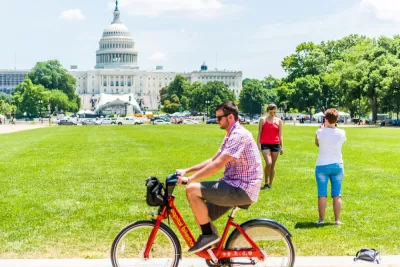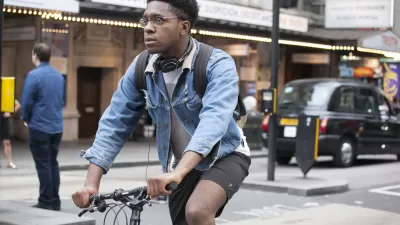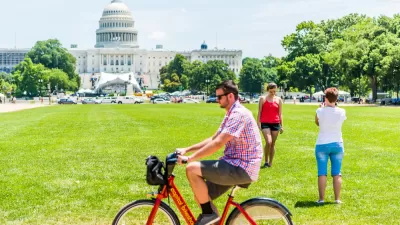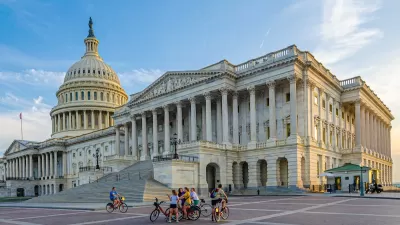The station on the White House grounds has been reinstated as part of Capital Bikeshare's push to expand the network by dozens of new stations by the end of the year.

After the Trump administration removed Capital Bikeshare from the White House grounds citing "security concerns," reports Luz Lazo, the station at E Street and South Executive Avenue was reinstalled last week with four more bikes than prior to its removal.
"Local leaders say it is about time that workers at 1600 Pennsylvania Ave. have the choice to get back on two wheels." Mayor Muriel Bowser praised the move, expressing pride that the District has "a growing population of people who bike to work — including the dedicated public servants who work at the White House."
Installed in 2010 at the request of the Obama administration, the station "can be used only by riders with access to the White House grounds" and is not visible to other users in the Capital Bikeshare or Lyft apps. Lyft officials say "they worked with the Biden administration for months to return the bike-sharing location to the city’s top address as the nation’s capital seeks a return to normal while relying more on biking" and see it as "an important symbol, setting an example for DC metro residents and people in cities around the country," according to former transportation secretary and Lyft chief policy officer Anthony Foxx.
Capital Bikeshare is adding dozens of stations this year, "including hundreds of bikes across a network that covers the District, Alexandria and Falls Church, as well as Arlington, Fairfax, Montgomery and Prince George’s counties" as part of a $19 million plan to increase the system by 80 stations. Currently, D.C. has 330 stations, 2,500 pedal bikes, and 600 electric bikes in its fleet, the largest share in Capital Bikeshare's regional network.
FULL STORY: With Trump gone, Capital Bikeshare returns to the White House

Alabama: Trump Terminates Settlements for Black Communities Harmed By Raw Sewage
Trump deemed the landmark civil rights agreement “illegal DEI and environmental justice policy.”

Study: Maui’s Plan to Convert Vacation Rentals to Long-Term Housing Could Cause Nearly $1 Billion Economic Loss
The plan would reduce visitor accommodation by 25% resulting in 1,900 jobs lost.

Why Should We Subsidize Public Transportation?
Many public transit agencies face financial stress due to rising costs, declining fare revenue, and declining subsidies. Transit advocates must provide a strong business case for increasing public transit funding.

Paris Bike Boom Leads to Steep Drop in Air Pollution
The French city’s air quality has improved dramatically in the past 20 years, coinciding with a growth in cycling.

Why Housing Costs More to Build in California Than in Texas
Hard costs like labor and materials combined with ‘soft’ costs such as permitting make building in the San Francisco Bay Area almost three times as costly as in Texas cities.

San Diego County Sees a Rise in Urban Coyotes
San Diego County experiences a rise in urban coyotes, as sightings become prevalent throughout its urban neighbourhoods and surrounding areas.
Urban Design for Planners 1: Software Tools
This six-course series explores essential urban design concepts using open source software and equips planners with the tools they need to participate fully in the urban design process.
Planning for Universal Design
Learn the tools for implementing Universal Design in planning regulations.
Smith Gee Studio
Alamo Area Metropolitan Planning Organization
City of Santa Clarita
Institute for Housing and Urban Development Studies (IHS)
City of Grandview
Harvard GSD Executive Education
Toledo-Lucas County Plan Commissions
Salt Lake City
NYU Wagner Graduate School of Public Service





























